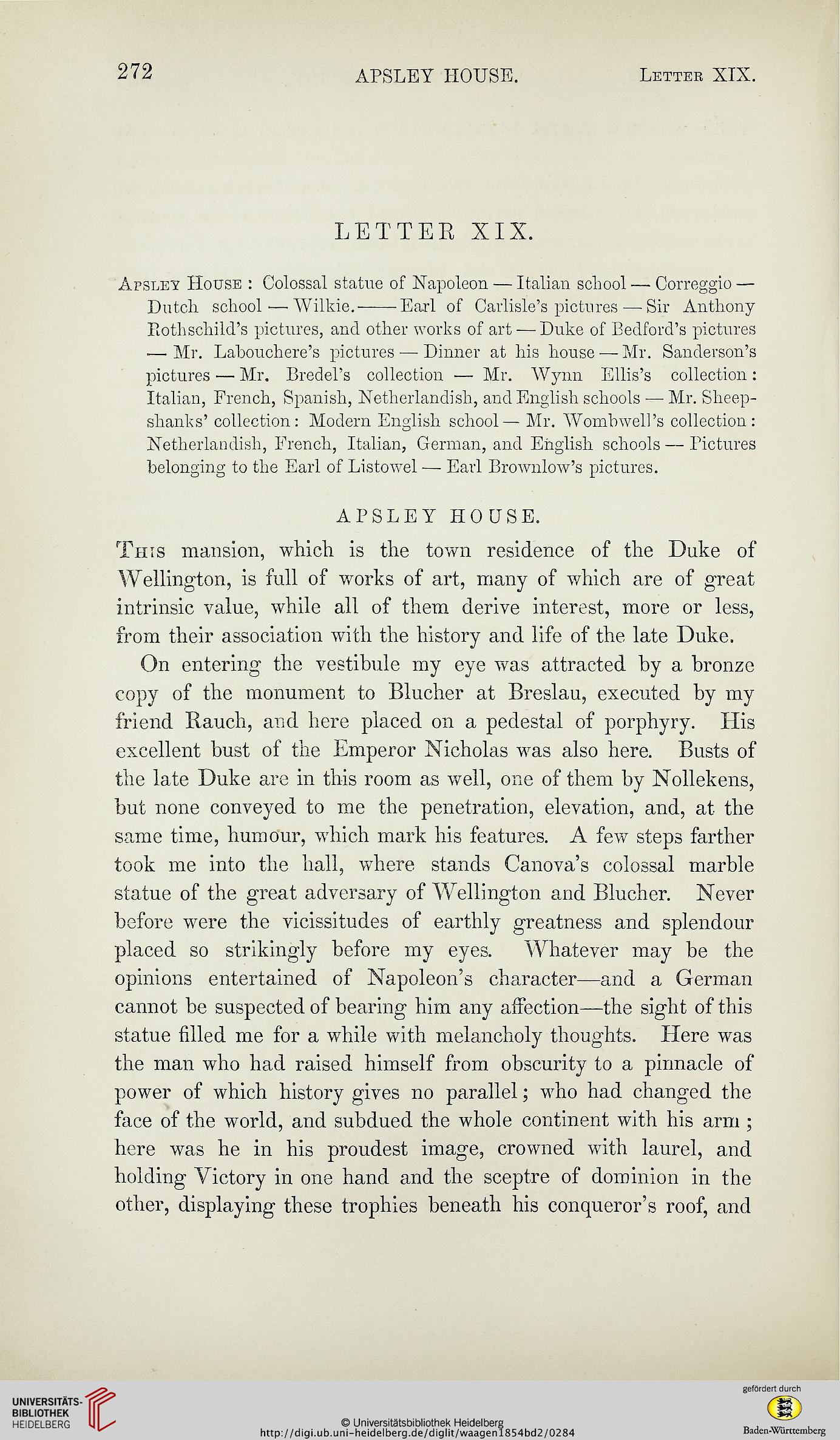272
APSLEY HOUSE.
Letter XTX.
LETTER XIX.
Apslev House : Colossal statue of Napoleon — Italian school — Correggio —
Dutch school — Wilkie.--Earl of Carlisle's pictures — Sir Anthony
Rothschild's pictures, and other works of art — Duke of Bedford's pictures
— Mr. Lahouchere's pictures — Dinner at his house — Mr. Sanderson's
pictures — Mr. Bredel's collection — Mr. Wynn Ellis's collection:
Italian, French, Spanish, Netherlandish, and English schools — Mr. Sheep-
shanks' collection: Modern English school— Mr. AVomb well's collection:
Netherlandish, French, Italian, German, and English schools — Pictures
belonging to the Earl of Listowel — Earl Brownlow's pictures.
APSLEY HOUSE.
This mansion, which is the town residence of the Duke of
Wellington, is full of works of art, many of which are of great
intrinsic value, while all of them derive interest, more or less,
from their association with the history and life of the late Duke.
On entering the vestibule my eye was attracted by a bronze
copy of the monument to Blucher at Breslau, executed by my
friend Rauch, and here placed on a pedestal of porphyry. His
excellent bust of the Emperor Nicholas was also here. Busts of
the late Duke are in this room as well, one of them by Nollekens,
but none conveyed to me the penetration, elevation, and, at the
same time, humour, which mark his features. A few steps farther
took me into the hall, where stands Canova's colossal marble
statue of the great adversary of Wellington and Blucher. Never
before were the vicissitudes of earthly greatness and splendour
placed so strikingly before my eyes. Whatever may be the
opinions entertained of Napoleon's character—and a German
cannot be suspected of bearing him any affection—the sight of this
statue filled me for a while with melancholy thoughts. Here was
the man who had raised himself from obscurity to a pinnacle of
power of which history gives no parallel; who had changed the
face of the world, and subdued the whole continent with his arm ;
here was he in his proudest image, crowned with laurel, and
holding Victory in one hand and the sceptre of dominion in the
other, displaying these trophies beneath his conqueror's roof, and
APSLEY HOUSE.
Letter XTX.
LETTER XIX.
Apslev House : Colossal statue of Napoleon — Italian school — Correggio —
Dutch school — Wilkie.--Earl of Carlisle's pictures — Sir Anthony
Rothschild's pictures, and other works of art — Duke of Bedford's pictures
— Mr. Lahouchere's pictures — Dinner at his house — Mr. Sanderson's
pictures — Mr. Bredel's collection — Mr. Wynn Ellis's collection:
Italian, French, Spanish, Netherlandish, and English schools — Mr. Sheep-
shanks' collection: Modern English school— Mr. AVomb well's collection:
Netherlandish, French, Italian, German, and English schools — Pictures
belonging to the Earl of Listowel — Earl Brownlow's pictures.
APSLEY HOUSE.
This mansion, which is the town residence of the Duke of
Wellington, is full of works of art, many of which are of great
intrinsic value, while all of them derive interest, more or less,
from their association with the history and life of the late Duke.
On entering the vestibule my eye was attracted by a bronze
copy of the monument to Blucher at Breslau, executed by my
friend Rauch, and here placed on a pedestal of porphyry. His
excellent bust of the Emperor Nicholas was also here. Busts of
the late Duke are in this room as well, one of them by Nollekens,
but none conveyed to me the penetration, elevation, and, at the
same time, humour, which mark his features. A few steps farther
took me into the hall, where stands Canova's colossal marble
statue of the great adversary of Wellington and Blucher. Never
before were the vicissitudes of earthly greatness and splendour
placed so strikingly before my eyes. Whatever may be the
opinions entertained of Napoleon's character—and a German
cannot be suspected of bearing him any affection—the sight of this
statue filled me for a while with melancholy thoughts. Here was
the man who had raised himself from obscurity to a pinnacle of
power of which history gives no parallel; who had changed the
face of the world, and subdued the whole continent with his arm ;
here was he in his proudest image, crowned with laurel, and
holding Victory in one hand and the sceptre of dominion in the
other, displaying these trophies beneath his conqueror's roof, and




